Copyright
If you are serious about writing songs as a professional or semi-professional songwriter, you must ensure your work is subject to copyright - to stop others copying (stealing?) all or part of one of your songs.
Actually there are two forms of copyright. There is copyright for the song itself and there is copyright for any particular recording of the song
As soon as you complete a song and it enters the public domain - as a set of printed lyrics or as a recording, it automatically become subject to copyright - and in theory at least you have protection
However there are other steps you can take to make the protection clearer.
One simple thing you can do is to load your song to one of the online services such as SoundCloud or Bandcamp. When you load it, it is automatically timestamped, so you have access to some form of proof that you produced it at a particular time. Equally simple is to e-mail the song to yourself and use the email timestamp as your evidence.
In the US you can register the song with the US Copyright office but in the UK there is no central government agency which provides the same service.
There is a variety of third party agencies that will take a copy of your song, log and timestamp it and even issue a certificate of registration which you can use as proof of your work.. (I use an agency called Copyright House). Of course you pay for this service - but the cost is reasonable snd it might make life easier if ever you are involved in a copyright dispute.
It is worth pointing out that if, like me, you make use of AI services to help craft your song, then the song performance cannot be copyrighted. Like, me though, if you write the lyrics yourself, these are subject to copyright.
Again, if you are, or intend to become, an active professional songwriter.it is worth joining PRS (the Performing Rights Society as was but now they seem to prefer the title PRS for Music). This will be covered in a little more detail in a future post about 'Royalties'.
In summary if you are based in the UK, you should
Keep your raw files (sessions, lyrics documents, recordings).
Use a timestamped upload (SoundCloud, Bandcamp, YouTube).
Optionally use a registration/timestamp service if you want belt-and-braces proof.
If you are based in he US, register your outputs with the CopyrightOffice.
Note : The post offers some basic information and tips. It does not constituter legal advice. Remember also that rules and regulations may change over time, so it is worth checking the up-to-date position.
